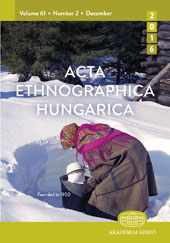Intangible Cultural Heritage Communities in the Network of the Skanzen Hungarian Open Air Museum
Intangible Cultural Heritage Communities in the Network of the Skanzen Hungarian Open Air Museum
Author(s): Eszter Csonka-TakácsSubject(s): Cultural history, Museology & Heritage Studies, Cultural Anthropology / Ethnology, Sociology of Culture
Published by: Akadémiai Kiadó
Keywords: intangible cultural heritage; community; safeguarding; cultural diversity; Hungarian Open Air Museum;
Summary/Abstract: In Hungary, the professional coordinator of the execution of the 2003 UNESCO convention about the safeguarding of intangible cultural heritage is the Skanzen Hungarian Open Air Museum, celebrating its 50th birthday this year. During its existence, the institution has formed an extensive community and professional network and has become a knowledge center concerning the protection of cultural heritage. The establishment of the Directorate of Intangible Cultural Heritage at the Museum is closely connected to the topic, as it constructed its own national networks based on this background. With respect to the philosophy of the Skanzen, together with the sponsoring cultural ministry, the Directorate created a heritage protection mechanism that focuses on communities retaining and maintaining their identity as a cultural practice, actively engaging them in the unfolding and registration of their intangible cultural heritage. At the same time, it pays attention to continuous communication and options for exchanging experiences. The Hungarian model, which is internationally acknowledged, is exactly ten years old, since Hungary joined the convention in 2006.
Journal: Acta Ethnographica Hungarica
- Issue Year: 61/2016
- Issue No: 2
- Page Range: 431-439
- Page Count: 9
- Language: English
- Content File-PDF

